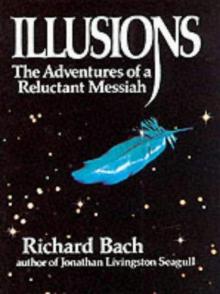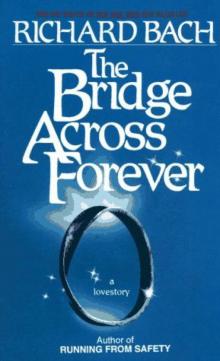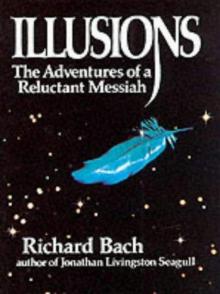- Home
- Richard Bach
Hypnotizing Maria: A Story Page 2
Hypnotizing Maria: A Story Read online
Page 2
After the headline, though, the reporter told the story fairly straight. When her husband collapsed in the air, Maria Ochoa, 63, thought he had died; she was frightened, called for help, et cetera.
Then he read this: “I never could've landed by myself, but the man in the other plane said I could. I swear to God he hypnotized me, right in the air. ‘Pretend you're an airline pilot.’ I pretended because I don't know how to fly. But when I woke up, the airplane had landed safe!”
The story said her husband had suffered a stroke and would recover.
Airline-captain role play works well for students, he thought, it always has.
He stumbled, though, on what she had said.
Hypnotized her? He walked to the airport café for breakfast, wondering hypnotism, remembering thirty years gone as though it had been yesterday.
CHAPTER FOUR
He had taken a seat in an aisle up front, row A, expecting when Blacksmyth the Great called for volunteers from the audience, he might be asked.
Near the end of the show, it felt like fun to step up to the stage, though he doubted he could be hypnotized and wouldn't be chosen. Two others, man and woman, joined him there.
Blacksmyth the hypnotist, distinguished in white tie and tuxedo but friendly of voice and manner, asked the three to stand in a row and they did, facing the audience. Jamie Forbes was on the end closest to stage center.
The showman stepped behind the volunteers, touched the woman on the shoulder, pulling her gently off balance. She took a step back to regain it.
He did the same to the next in line, and the man stepped back, as well.
Forbes resolved to be different. When the hypnotist's hand touched his shoulder, he tilted with the pressure, trusting that the man wouldn't have much of a show if he let his subject fall over on stage.
Blacksmyth caught him at once, thanked the other volunteers and dismissed them to a round of applause.
Things had gone too far. “I'm sorry,” Jamie whispered while the sounds died away, “but I can't be hypnotized.”
“Oh,” replied the performer, softly. “Then what are you doing on this planet?”
The hypnotist paused, saying nothing, and began to smile at Jamie Forbes. A murmur of laughter from audience—what was going to happen to this poor subject?
Just now the subject felt sorry for the entertainer, thought better of walking off-stage, and decided that he might as well play along. He had warned the man, but there was no cause to embarrass him in front of a thousand paying customers.
“What is your name, sir?” the hypnotist asked, loud enough for all to hear.
“Jamie.”
“Jamie, have we met?” he asked. “Have we ever seen each other before this evening?”
“No sir, we have not.”
“That is correct. Now Jamie,” he said, “let's you and me take a little walk in our minds. You see these seven steps ahead of us, we'll go down the steps together. Together we'll go down the steps; down, down, deeper, deeper . . .”
Jamie Forbes didn't notice the steps at first. They must have been plastic or balsa wood, painted to look like stone, and he walked them down with the hypnotist, step by step. He wondered how the audience could see the show when the volunteer was going to wind up practically underneath the stage, but concluded that was Blacksmyth's problem. He must have some scheme with mirrors.
At the bottom of the steps was a heavy wooden door. Blacksmyth asked him to step through, and when he did, closed the door behind him. His voice came clearly through the walls, describing for the audience what Jamie saw before him: an empty stone room, no doors, no windows, yet plenty of light.
The room wasn't square but round, and when he turned to see where he entered, the door had disappeared. Disguised, probably, to match the stone.
Seems like stone, he reminded myself. Painted cloth to look like irregular squares of granite, some medieval fortress.
“Look around you, Jamie,” said Blacksmyth from outside, “and tell us what you see.”
He chose not to say what he knew, that it was cloth. “Looks like a stone room,” he said, “inside a castle tower. No windows. No doors.”
“Are you sure it's stone?” came the hypnotist's voice.
Don't push me, he thought. Don't count on me to lie for you. “Looks like stone. I'm not sure.”
“Find out.”
It's your reputation, Mr. Blacksmyth, he thought. He walked to the wall, touched it. It felt rough and hard. He pushed, gently. “It feels like stone.”
“I want you to be sure, Jamie. Put your hands on the stone and push as hard as you can. The harder you push, the more solid it will become.”
What an odd thing to say. As hard as I can push is pretty hard, he thought, and there's going to be wood blocks all over your stage. He pushed gently, at first, then harder, then harder still. It was solid, all right. This may be more a magic show, he thought, than mind stuff. How did Blacksmyth build a stone room under the stage, and how does he move it from theater to theater?
He looked for the door behind its disguise, but everywhere was stone. He pressed against the wall, kicked it here and there, walked around a room no more than ten feet in diameter, straining against the granite, kicking it hard enough to dent, if it were balsa wood or plastic.
It was frightening but not much, as he knew Blacksmyth would have to set him free some time soon.
“Jamie, there's a way out,” said the showman. “Can you tell us what it is?”
I could climb it, he thought, if the spaces between the stones were wider. Looking upward, he saw a ceiling of the same stuff, solid blocks. On one part of the wall was a scorched blackened place, as though there had been a torch placed there for light. Now the torch and the fitting that held it were gone.
“I can't climb it,” he said.
“You say you cannot climb the wall,” said Blacksmyth, loud and theatrical. “Jamie, have you tried?”
He took that for a hint, that there may be hidden handholds.
Not. He stepped on the edge of the first course of stone, his shoe slipped off at once.
“There's no climbing it,” he said.
“Can you tunnel under the wall, Jamie?”
That seemed like a silly idea, the floor being the same stuff as the wall and ceiling. He knelt down and scratched at the surface, but it was as unyielding as the rest of the room.
“How about the door? Try the door.”
“Door's gone,” he replied, feeling foolish. How could the door be gone? He knew it was part of the trick, but the fact was that a door no longer existed.
Crossing to where he entered, Jamie Forbes threw his shoulder against what looked like stone but may have been stuccoed plywood. He tried that, succeeded in bruising his shoulder. How did the whole place get to be rock?
“There's a way out,” said Blacksmyth again. “Can you tell us what it is?”
Jamie Forbes was tired and frustrated. Whatever was going on, the trick was getting old. No doors, no windows, no keys, no ropes or wires or pulleys, no tools, no known combination of touching this slab then that one. If there were a way out, some secret password that needed shouting, he hadn't a clue.
“Give up?”
Instead of answering, he backed against one side of the room, ran three steps and gave a flying kick to the other. He wound up on the ground, of course, the wall unmarked.
“Yeah,” he said, getting up again. “I give.”
“Here's the answer,” came Blacksmyth's voice, filled with drama. “Jamie, walk through the wall!”
The man's gone mad, he thought, he's lost it in the middle of his show. “I can't do that,” he said, a little sullen. “I don't walk through walls.”
“Jamie, I'm going to tell you the truth. I am not kidding. The walls are in your mind. You can walk through them if you believe you can.”
He rested his hand, at arm's length, on the stone. “Yeah,” he said, “right.”
“OK, Jamie. I'll give it all awa
y for you, right now; I'll give the whole trick away. You don't recall this, but you've been hypnotized. There are no walls around you. You are standing on a stage in the Lafayette Hotel in Long Beach, California, and you are the only person in this hall who believes that you've been walled in.”
The stone didn't flicker. “Why are you doing this to me,” he asked. “Are you doing this for fun?”
“Yes, Jamie,” said Blacksmyth gently. “We are doing this for fun. You volunteered for this and for so long as you live, you shall never forget what is happening today.”
“Help me, please,” he said, not a trace of pride or anger.
“I'll help you help yourself,” said Blacksmyth. “We need never be prisoner of our own beliefs. At the count of three, I shall walk through the stone at one side of the room. I shall take your hand in mine and we shall walk together through the wall on the other side. And you will be free.”
What does one say to that? Jamie chose silence.
“One,” came the hypnotist's voice. “Two. . . .”Long pause. “Three.”
All at once, it was as Blacksmyth had said. For an instant, Jamie caught a blurry twisted place in the stone, as though it were dry water; the next instant Blacksmyth in his spotless tuxedo stepped through the wall into the prison, offering his hand.
Flooded with relief, Jamie took the man's hand. “I didn't think . . .”
The hypnotist neither slowed nor replied, striding toward the stone on the opposite side of the room, pulling his subject with him.
It must have sounded like a scream, though he didn't mean it that way. From Jamie Forbes came a cry of fearsome baffled astonishment.
Blacksmyth's body disappeared into the stone. For an instant Jamie held tightly to a disembodied arm, whose wrist and hand moved forward, drawing him directly into the wall.
Whatever next sound he gave might have been muffled by the wall, and in the following instant there was a click like the snap of fingers and he stood back on stage, holding Mr. Blacksmyth's hand, blinking in the spotlight, enveloped in fascinated applause.
The people he could see, in the first rows before the dark behind the spotlights, were rising to their feet, a standing ovation for the hypnotist, and in an odd way, for himself.
The act was Blacksmyth's finale. He left his subject soaked in applause, disappeared into the wings, returned twice to the stage before the sound of the crowd hushed to gentle patter and the murmur of many voices, folks gathering their programs, jackets and purses as the house lights came up.
Jamie Forbes made his way unsteadily down the steps to the main floor, a few of the audience there to smile and thank him for his courage to volunteer: “Was it real, did it feel real to you, the stone and all?”
“Of course it was real!”
They laughed, then puzzled smiles, explaining. “You were on the stage, in the center. Empty stage! Blacksmyth on the left, talking to you. You made it seem so real! The leap at the end, and the kick, it was amazing! You really believed . . . did you?”
More than believed. He knew.
Jamie Forbes lived the evening through, over and again, all the way back to his apartment.
Stone solid as any boulder, hard as any steel that ever he had touched. Belief? He would have starved to death in that room, trapped there by . . . by what? More than belief. By absolute, unquestioning conviction.
From the barest of suggestions: “Let's you and me take a little walk in our minds . . .”
What was I thinking, “I can't be hypnotized?” I fell for some smooth talk, I was convinced into prison. How can that happen?
Years later, he learned he wouldn't have died there, left alone. He would finally have slept, and waking, recovered from the prison-beliefs that seemed so real to him a few hours before.
CHAPTER FIVE
The sign in the lobby next evening was unchanged:
This last night of the show, Jamie Forbes took a seat mid-audience, row S center, a hundred feet from the stage. No volunteering this time, he thought. Tonight we watch. What did this man do to me? How did he do it?
Each act was fun, of course, but he shrugged the fun aside and watched what happened: a few quiet words and the first volunteer was lost in trance.
One glance through a shuffled deck, she could recall the sequence of fifty-two playing cards, error-free, as they were drawn from the deck.
“Your arm is as stiff and solid as an iron bar,” commanded the hypnotist to a relatively small volunteer, and no man from the audience was strong enough to bend it.
“You can clearly see the spirit of Mrs. Dora Chapman's departed husband,” he suggested to a teenage girl, “standing before you now. Can you describe Mister Chapman for us?”
“Yes, sir,” she said, unblinking. “He's tall, slender, brown eyes, black hair combed straight back, a small mustache. He smiles as though he is awfully happy. He is wearing what look like riding clothes, formal and . . . dashing, I guess you'd call it, a black bow tie . . .”
After her description his photograph flashed onscreen for the audience to see, the man in different clothes, but as she said. A sling supported his arm, sprained or broken not long before the photo was taken, but it was the man, all right. Somehow she saw him, unless the girl was cheating, already clued about the subject, which Jamie Forbes doubted.
“He loved riding, and his horse . . ., ” his widow whispered to Blacksmyth, then repeated it, a soft voice in the microphone, when he asked her to tell the audience.
So it went, as Blacksmyth delivered on his promise, astonishing powers brought forth, from people as ordinary as Jamie himself had been the evening before.
Is this audience, he wondered, all past-show volunteers, trying to understand what happened to us last week?
It was all he could do to keep from reliving his own trance, came the show's final act. There the three volunteers on stage. One stepped back as the hypnotist pressed gently on a shoulder, the second began to fall and was caught at once, the third resisted the touch. First and third excused with thanks and applause, courtesy somehow important to the showman.
Jamie strained to catch Blacksmyth's words, softly spoken to the remaining volunteer, tried to read his lips. All he caught was the word “voyage.”The hypnotist said something different to her than he had to Jamie the night before, took a few more seconds with her.
“And what is your name, ma'am?” he asked for all to hear.
“Lonnie,” she replied, a firm voice.
“That is correct!” he said. Waiting for the laughter to die, he raised his voice, continued. “Now Lonnie, have you and I ever met, have we ever seen each other before this evening?”
“No.”
“That is true,” he said. “Lonnie, if you will kindly step this way . . .”
Nothing could Jamie Forbes see that pointed an arrow: “Hypnotist,” toward the man on stage; no label for her: “Already in Trance.” Just two people walking slowly together, an everyday moment.
They moved from the edge of the stage to the center. She continued three steps farther by herself, as though unaware she was alone, turned, and began to look about her.
Jamie's hands went cold. He knew what she was seeing: walls, stone, the prison cell. But there was nothing around her. Nothing. Air. Stage. Audience. Not the sheerest curtain, no mirrors, no tricks of lighting.
Yet her face clouded, as he knew his had. What had become of the door? Where had Blacksmyth gone?
It hadn't occurred to him: where was the light coming from? Nor did it occur to her. He wondered if she saw the burnt torch-mark on the stone.
He watched her reach to the invisible wall, touch it. Push against it, move left, push again.
She may be imagining a different sort of stone, he thought, but she had created it just as hard, just as solid.
“Hello . . .” she said. “Can anybody hear me?”
The audience chuckled, of course we can hear you. We're right here!
Jamie Forbes didn't smile. About now, he had bee
n a little frightened.
Frightened of what? Why had he been afraid?
Trapped, that's why. Locked in stone. No doors, no windows, stone ceiling stone floor . . . bug in a teacup, no way out.
All of it wrong, he thought, watching. Blacksmyth had said to walk down the steps, had murmured something more. At the bottom of the steps was the door. Every minute as real as yesterday. Tonight he saw it differently—the stage, an empty stage with that poor woman walled by her own mind.
The audience smiled, fascinated, while it was all Jamie could do to keep himself in the seat, stop himself from bolting down the aisle to the stage, rescue her, save her . . .
From what, Jamie, he thought, save her from what? How do you unhypnotize someone sunk deep in knowing that massive walls which you cannot see are pressing in on her, imprisoning her, no food no water, air itself running out?
Who could have reached him, told him his walls were fantasy and made him believe it?
I wouldn't have seen rescuers, he thought. Not until they were close enough.
Close enough and then what? I'd see someone walking to me out of solid stone, this is a person I'm suddenly going to believe? He'll say it's all in your mind and I'm going to say oh, sure, thank you and my walls will disappear?
“Hello?” said Lonnie. “Mister Blacksmyth? Did you mean to leave me here? Mister Blacksmyth can you hear me? Mister Blacksmyth!”
Jamie looked at the hypnotist. How can he stand it, her screams? because in a minute she'll be screaming.
Lonnie threw herself against the curving stone of her mind, pounded on it so that her fists would bleed, before long.
Enough, Blacksmyth, he thought. There's enough, now.
A hush of whispers began in the auditorium, smiles gone, audience getting uncomfortable.
Perfect timing, the hypnotist walked to stand not five feet from his subject, every eye in the house upon him.
“Lonnie, there's a way out,” he said. “Can you tell us what it is?”
Her face was anguished now. “No,” she said, hopeless.
For God's sake, Lonnie, thought Jamie Forbes, walk over and punch the guy!

 Illusions: The Adventures of a Reluctant Messiah
Illusions: The Adventures of a Reluctant Messiah Biplane
Biplane Stranger to the Ground
Stranger to the Ground A Gift of Wings
A Gift of Wings Holidays on Ice
Holidays on Ice Hypnotizing Maria: A Story
Hypnotizing Maria: A Story Jonathan Livingston Seagull
Jonathan Livingston Seagull The Bridge Across Forever: A True Love Story
The Bridge Across Forever: A True Love Story Nothing by Chance
Nothing by Chance Illusions
Illusions Jonathan Livingston Seagull: The New Complete Edition
Jonathan Livingston Seagull: The New Complete Edition Hypnotizing Maria
Hypnotizing Maria Illusions II: The Adventures of a Reluctant Student (Kindle Single)
Illusions II: The Adventures of a Reluctant Student (Kindle Single)